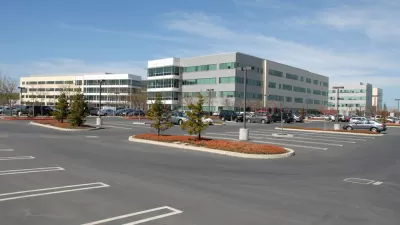To address the growth of commute traffic to the Google campus and neighboring tech companies in the north (of Hwy. 101) part of this city of 74,000 in Silicon Valley, the city council is proposing a toll on all three road entrances to the area.
Google just can't get a break. Either their commute buses are attacked (literally, in some cases) in San Francisco, or the commute traffic to their Silicon Valley campus is targeted, and may be used as a reason to reduce building expansion.
The Mountain View city council may very well beat both Manhattan and San Francisco in applying congestion (or cordon) pricing as a way to reduce auto traffic. Daniel DeBolt of the local Mountain View Voice writes that "on Monday (April 28), City Council members supported the use of "congestion pricing" as a means to enforce proposed limits on commuter traffic into the city's growing North Bayshore office park."
Like the system now used to collect tolls on the Golden Gate Bridge, license plate cameras are proposed for the three "gateway" roads providing the only vehicle access to the north side of Highway 101 in Mountain View, potentially enforcing a yet-to-be-determined fee on thousands of employees of Google, Intuit, Microsoft and others who choose to commute by car during morning rush hour instead of taking a shuttle or a bike.
Unlike the Manhattan and San Francisco plans, the plan appears mainly to measure commute traffic as opposed to raising revenue from the cordon toll. Presumably the toll would be used primarily to create the disincentive to drive to work during peak hours.
If approved in December as part of a "North Bayshore precise plan," Google and others would not be allowed to build up to 3.4 million square feet of new offices in North Bayshore unless traffic on the three roads is kept under their collective capacity limit of 18,900 trips between 7 a.m. and 10 a.m. -- the "cap".
Google does not appear to be on board with the plan - preferring to build their way out of congestion. Google transportation planner Jeral Poskey "suggested the city try other measures first to manage traffic, including a new Charleston Road underpass to connect the road across Highway 101, and a new Highway 101 off-ramp onto Huff Avenue, possibly allowing better Google bus access."
Let's do everything we can to improve (streets and intersections), then we can give up and say, that's the trip cap," said Poskey, who is overseeing the development of transportation strategy for Google in Mountain View.
The idea for the commute cap comes from neighboring Palo Alto who have successfully tamed car traffic to the Stanford University campus by using a county-imposed car trip "cap". Mountain View liked the idea of applying a market strategy to reach their trip reduction goal.
"Mayor Chris Clark described congestion pricing as a really good final tool we would have in our tool belt' to enforce such a cap," writes deBolt.
Not mentioned is whether state legislation would be required to apply a toll to city streets - although the toll would technically be applied to the 'gateway'. San Francisco, 36 miles to the north, would have sought legislation to implement their plan as the San Francisco Chronicle noted in 2008. Sadly, the plan doesn't appear to have moved past the study phase.
FULL STORY: "Congestion pricing" part of plan for Google's growth

Alabama: Trump Terminates Settlements for Black Communities Harmed By Raw Sewage
Trump deemed the landmark civil rights agreement “illegal DEI and environmental justice policy.”

Study: Maui’s Plan to Convert Vacation Rentals to Long-Term Housing Could Cause Nearly $1 Billion Economic Loss
The plan would reduce visitor accommodation by 25% resulting in 1,900 jobs lost.

Planetizen Federal Action Tracker
A weekly monitor of how Trump’s orders and actions are impacting planners and planning in America.

Wind Energy on the Rise Despite Federal Policy Reversal
The Trump administration is revoking federal support for renewable energy, but demand for new projects continues unabated.

Passengers Flock to Caltrain After Electrification
The new electric trains are running faster and more reliably, leading to strong ridership growth on the Bay Area rail system.

Texas Churches Rally Behind ‘Yes in God’s Back Yard’ Legislation
Religious leaders want the state to reduce zoning regulations to streamline leasing church-owned land to housing developers.
Urban Design for Planners 1: Software Tools
This six-course series explores essential urban design concepts using open source software and equips planners with the tools they need to participate fully in the urban design process.
Planning for Universal Design
Learn the tools for implementing Universal Design in planning regulations.
Caltrans
Smith Gee Studio
Institute for Housing and Urban Development Studies (IHS)
City of Grandview
Harvard GSD Executive Education
Toledo-Lucas County Plan Commissions
Salt Lake City
NYU Wagner Graduate School of Public Service




























